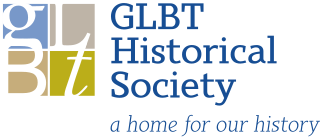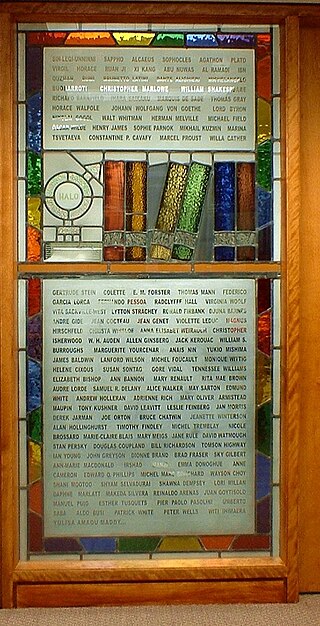Friends for Lesbian, Gay, Bisexual, Transgender, and Queer Concerns (FLGBTQC) is a faith community within the Religious Society of Friends in USA.
From a minute approved in 1999, FLGBTQC states: [1]
We seek to know that of God within ourselves and others. We seek to express God's truth in the Quaker and in the lesbian/gay/bisexual/transsexual/transgender communities, as it is made known to us. It is our hope to offer an oasis to those who have been spurned by the world at large. We are learning that radical inclusion and radical love bring further light to Quaker testimony and life. Our experience with oppression in our own lives leads us to seek ways to bring our witness to bear in the struggles of other oppressed peoples.
FLGBTQC publishes a semi-annual newsletter, which is received by 1,500 individuals and Quaker Meetings worldwide.
The group maintains a collection of Marriage Minutes by Quaker Meetings regarding same-sex marriage. FLGBTQC has also sponsored the publication of Each of Us Inevitable, ( ISBN 1199-01161-4), a collection of talks about coming to terms with one's identity and direction.
FLGBTQC holds twice-yearly Gatherings, one in February and one in July at the Friends General Conference Annual Gathering of Friends. Most participants live in the United States, which is where all of the February Gatherings (and all but one of the July ones) have been held for over twenty-five years.
FLGBTQC's origin comes from groups founded in the 1970s, when gay and lesbian Friends were first becoming visible in North American Quakerism. Initially, these Friends founded a group called Friends Committee for Concern. The group has since changed its name three times: first, to "Friends Committee on Gay Concerns" (FCGC), then to "Friends for Lesbian and Gay Concerns" (FLGC), and most recently, to "Friends for Lesbian, Gay, Bisexual, Transgender, and Queer Concerns" (FLGBTQC). This most recent name change occurred at the Gathering in February 2003, at Ghost Ranch, in New Mexico.

Lesbian, gay, bisexual, and transgender (LGBT) movements are social movements that advocate for LGBT people in society. Although there is not a primary or an overarching central organization that represents all LGBT people and their interests, numerous LGBT rights organizations are active worldwide. The first organization to promote LGBT rights was the Scientific-Humanitarian Committee, founded in 1897 in Berlin.
The views of Quakers around the world towards homosexuality encompass a range from complete celebration and the practice of same-sex marriage, to the view that homosexuality is sinfully deviant and contrary to God's intentions for sexual expression. The Religious Society of Friends (Quakers) is a historically Christian religious movement founded in 17th-century England; it has around 350,000 members. In Britain, Canada, New Zealand and Australia, many Quakers are supportive of homosexual relationships, while views are divided among U.S. meetings. The majority (52%) of Quakers live in Africa, and though views may differ, the Kenyan Church of Friends does not support homosexual relationships.

Queer Nation is an LGBTQ activist organization founded in March 1990 in New York City, by HIV/AIDS activists from ACT UP. The four founders were outraged at the escalation of anti-gay violence on the streets and prejudice in the arts and media. The group is known for its confrontational tactics, its slogans, and the practice of outing.

LGBT culture is a culture shared by lesbian, gay, bisexual, transgender, and queer individuals. It is sometimes referred to as queer culture, while the term gay culture may be used to mean "LGBT culture" or to refer specifically to homosexual culture.

The Audre Lorde Project is a Brooklyn, New York-based organization for LGBT people of color. The organization concentrates on community organizing and radical nonviolent activism around progressive issues within New York City, especially relating to LGBT communities, AIDS and HIV activism, pro-immigrant activism, prison reform and organizing among youth of color. It is named for the lesbian-feminist poet and activist Audre Lorde and was founded in 1994.

The March on Washington for Lesbian, Gay, and Bi Equal Rights and Liberation was a large political rally that took place in Washington, D.C., on April 25, 1993. Organizers estimated that 1,000,000 attended the March. The D.C. Police Department put the number between 800,000 and more than 1 million, making it one of the largest protests in American history. The National Park Service estimated attendance at 300,000, but their figure attracted so much negative attention that it shortly thereafter stopped issuing attendance estimates for similar events.
LGBT movements in the United States comprise an interwoven history of lesbian, gay, bisexual, transgender and allied movements in the United States of America, beginning in the early 20th century and influential in achieving social progress for lesbian, gay, bisexual, transgender and transsexual people.
This is a list of notable events in the history of LGBT rights that took place in the 1970s.

The Q Christian Fellowship (QCF) is an ecumenical Christian ministry focused on serving lesbian, bisexual, gay, transgender, queer, and straight ally Christians. It was founded in 2001 as the Gay Christian Network (GCN) by Justin Lee and is currently administered from Denver, Colorado. It was re-branded in 2018 to better reflect the diversity of the ministry and community they serve. According to the re-branding documents, the 'Q' does not correlate to any particular word. Instead, it is just the letter 'Q' open for interpretation.

The GLBT Historical Society maintains an extensive collection of archival materials, artifacts and graphic arts relating to the history of LGBT people in the United States, with a focus on the LGBT communities of San Francisco and Northern California.
Lesbian, gay, bisexual, transgender (LGBT) affirming denominations in Judaism are Jewish religious groups that welcome LGBT members and do not consider homosexuality to be a sin. They include both entire Jewish denominations, as well as individual synagogues. Some are composed mainly of non-LGBT members and also have specific programs to welcome LGBT people, while others are composed mainly of LGBT members.
The Spectrum Center is an office at the University of Michigan in Ann Arbor that is dedicated to providing education, outreach, and advocacy for the lesbian, gay, bisexual, transgender, queer, and allied (LGBTQA) community. Since the organizations' creation in 1971, the Spectrum Center's mission statement has been to "enrich the campus experience and develop students as individuals and as members of the LGBTQA community." The organization achieves this through student-centered education, outreach, advocacy and support.

In the post-Stonewall era, the role of libraries in providing information and services to LGBTQ individuals has been a topic of discussion among library professionals. Libraries can often play an important role for LGBTQ individuals looking to find information about coming out, health, and family topics, as well as leisure reading. In the past 50 years, advocate organizations for LGBTQ content in libraries have emerged, and numerous theorists have discussed various aspects of LGBTQ library service including privacy concerns, programming, collection development considerations and librarian/staff education needs, as well as special services for juvenile and teen patrons.
New York has a long history of LGBT community building, activism, and culture which extends to the early history of the city.
This is a timeline of notable events in the history of non-heterosexual conforming people of Asian and Pacific Islander ancestry, who may identify as LGBTIQGNC, men who have sex with men, or related culturally-specific identities. This timeline includes events both in Asia and the Pacific Islands and in the global Asian and Pacific Islander diaspora, as the histories are very deeply linked. Please note: this is a very incomplete timeline, notably lacking LGBTQ-specific items from the 1800s to 1970s, and should n0t be used as a research resource until additional material is added.

LGBT culture in Baltimore, Maryland is an important part of the culture of Baltimore, as well as being a focal point for the wider LGBT community in the Baltimore metropolitan area. Mount Vernon, known as Baltimore's gay village, is the central hub of the city's lesbian, gay, bisexual, and transgender communities.
Elizabeth Grill Watson was an American Quaker minister, curator, and feminist theologian.